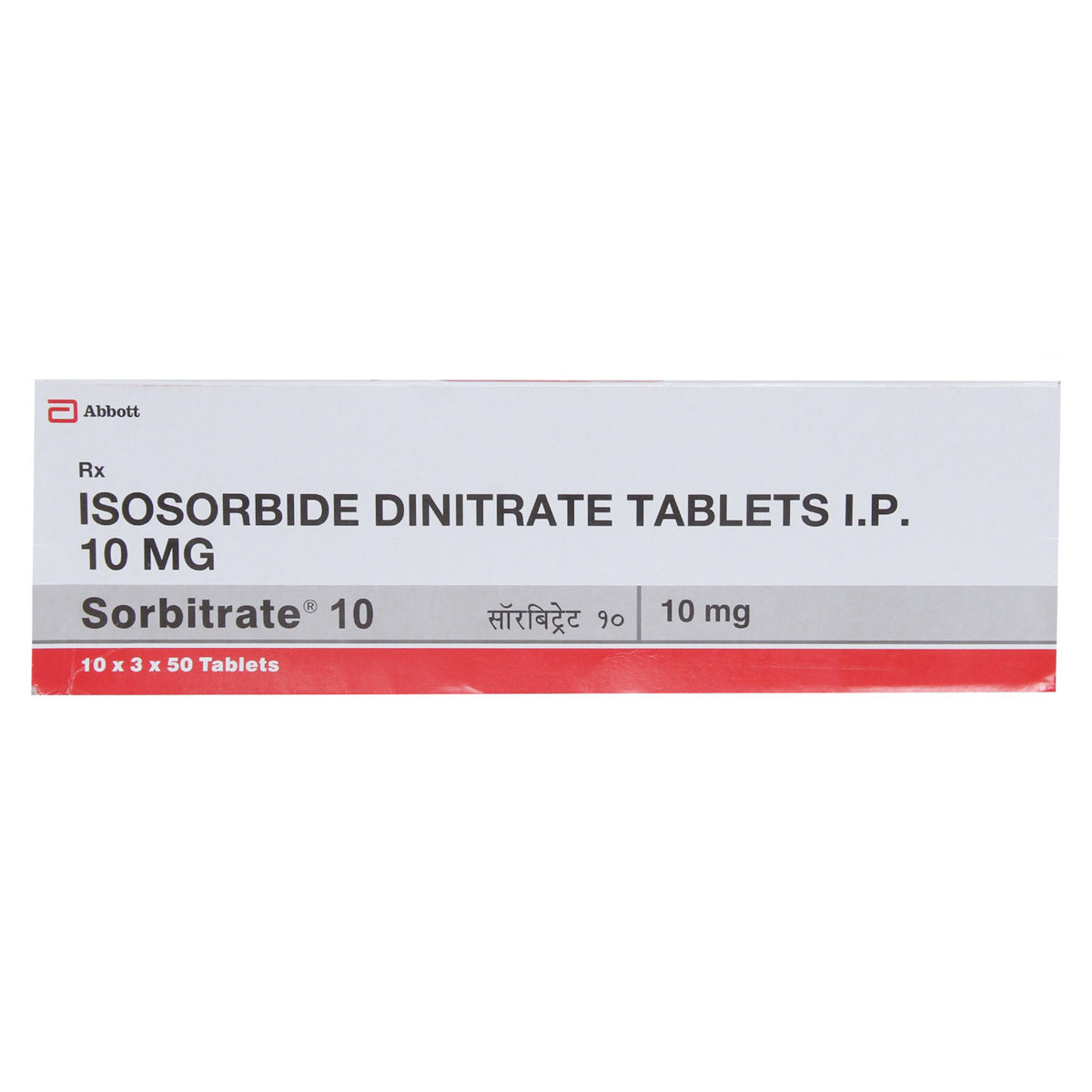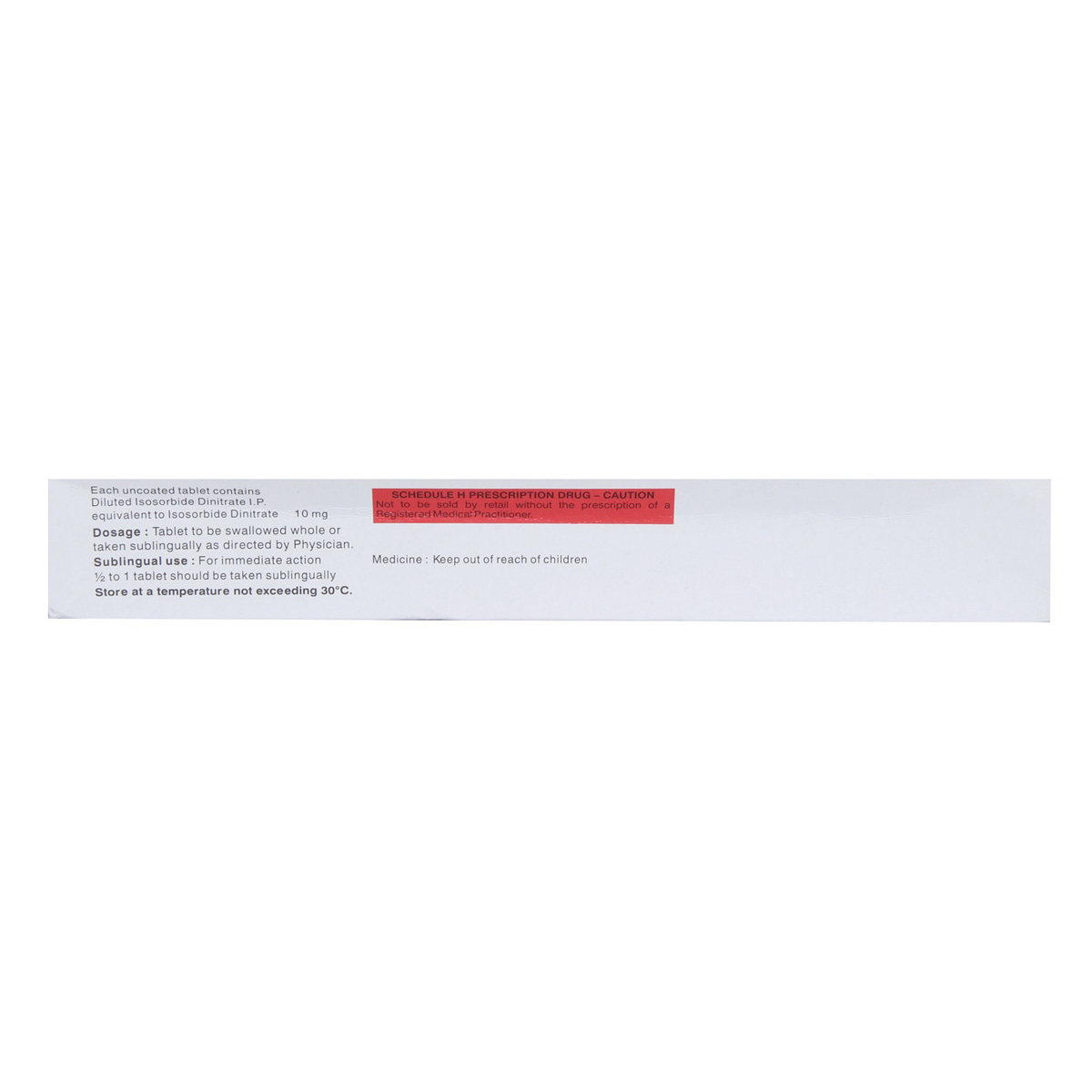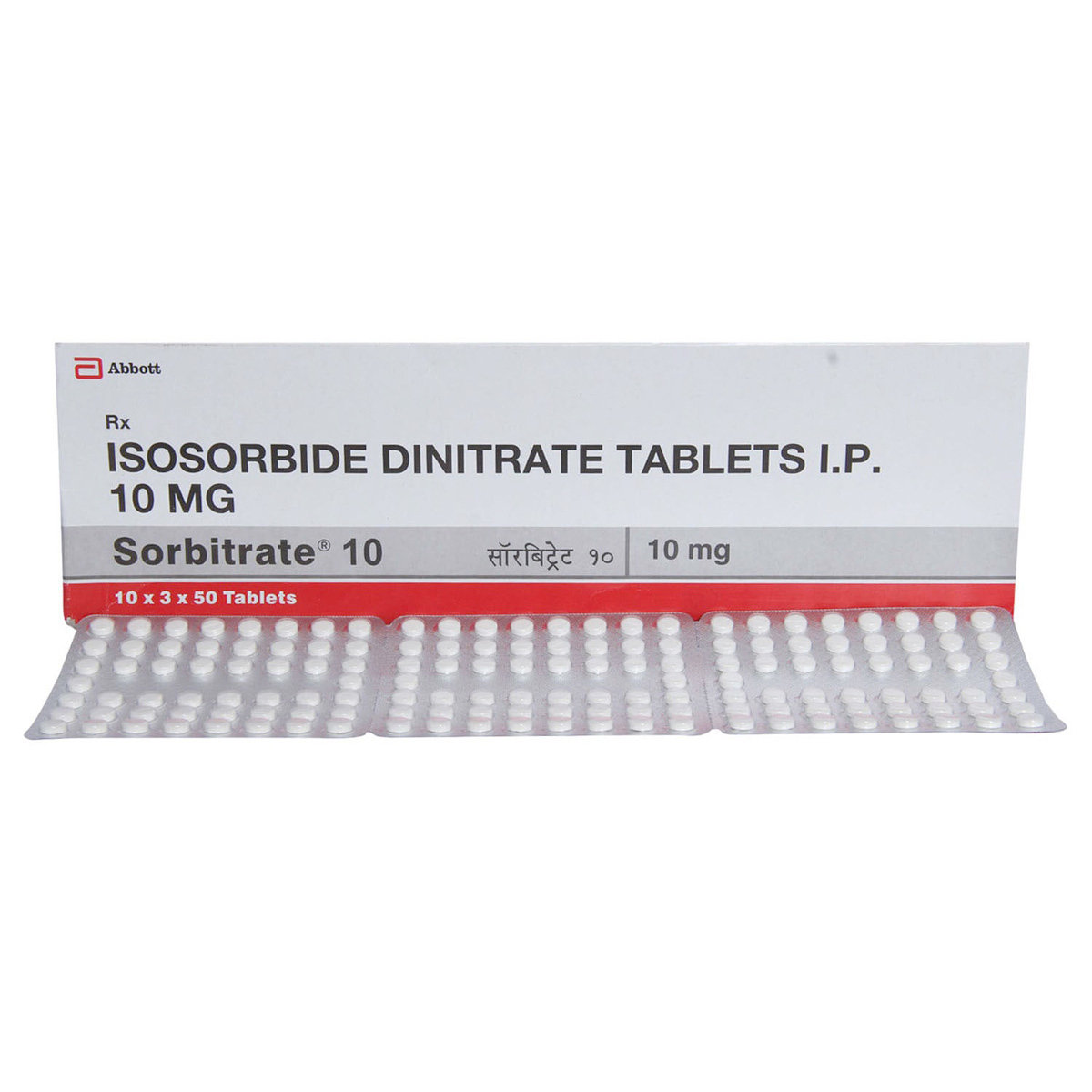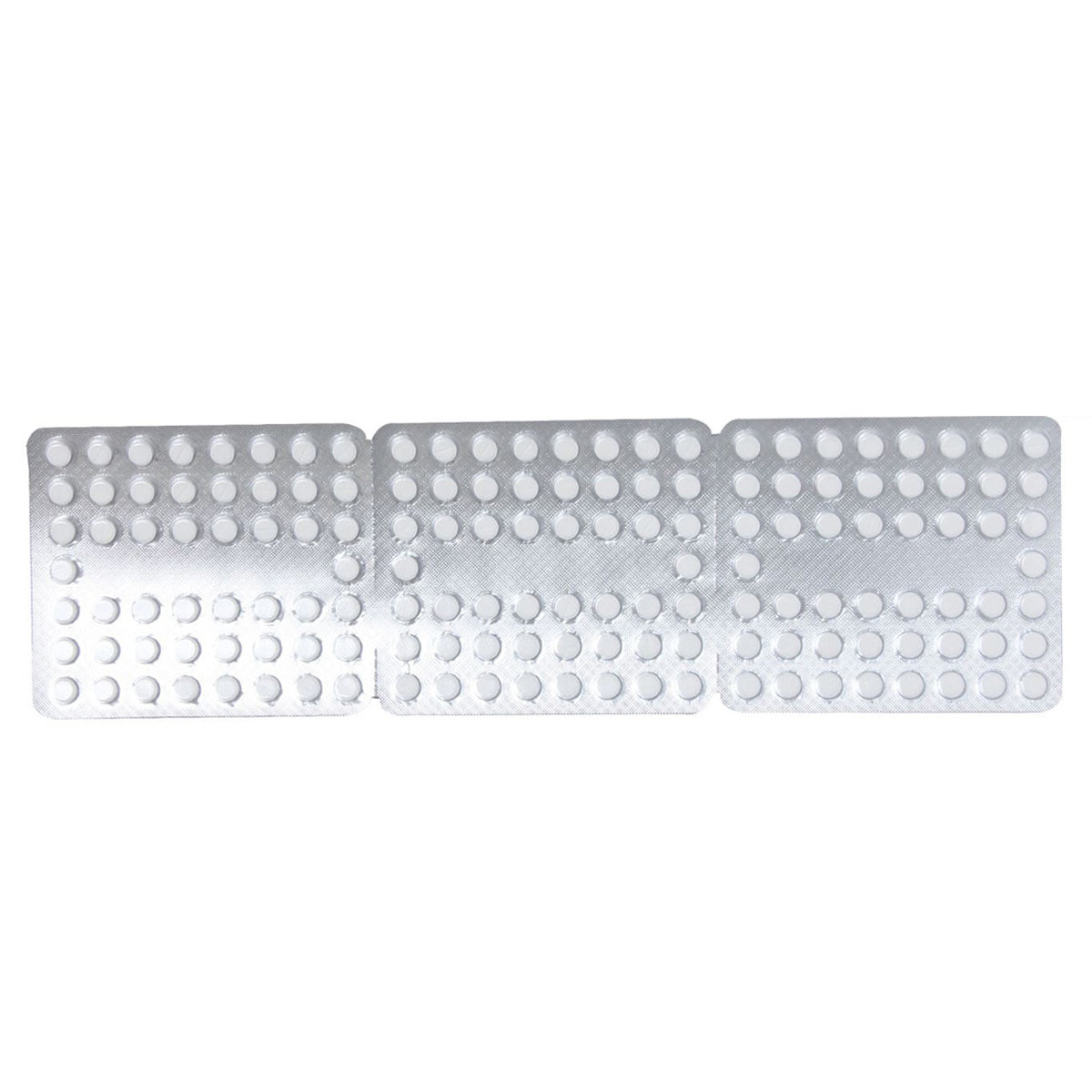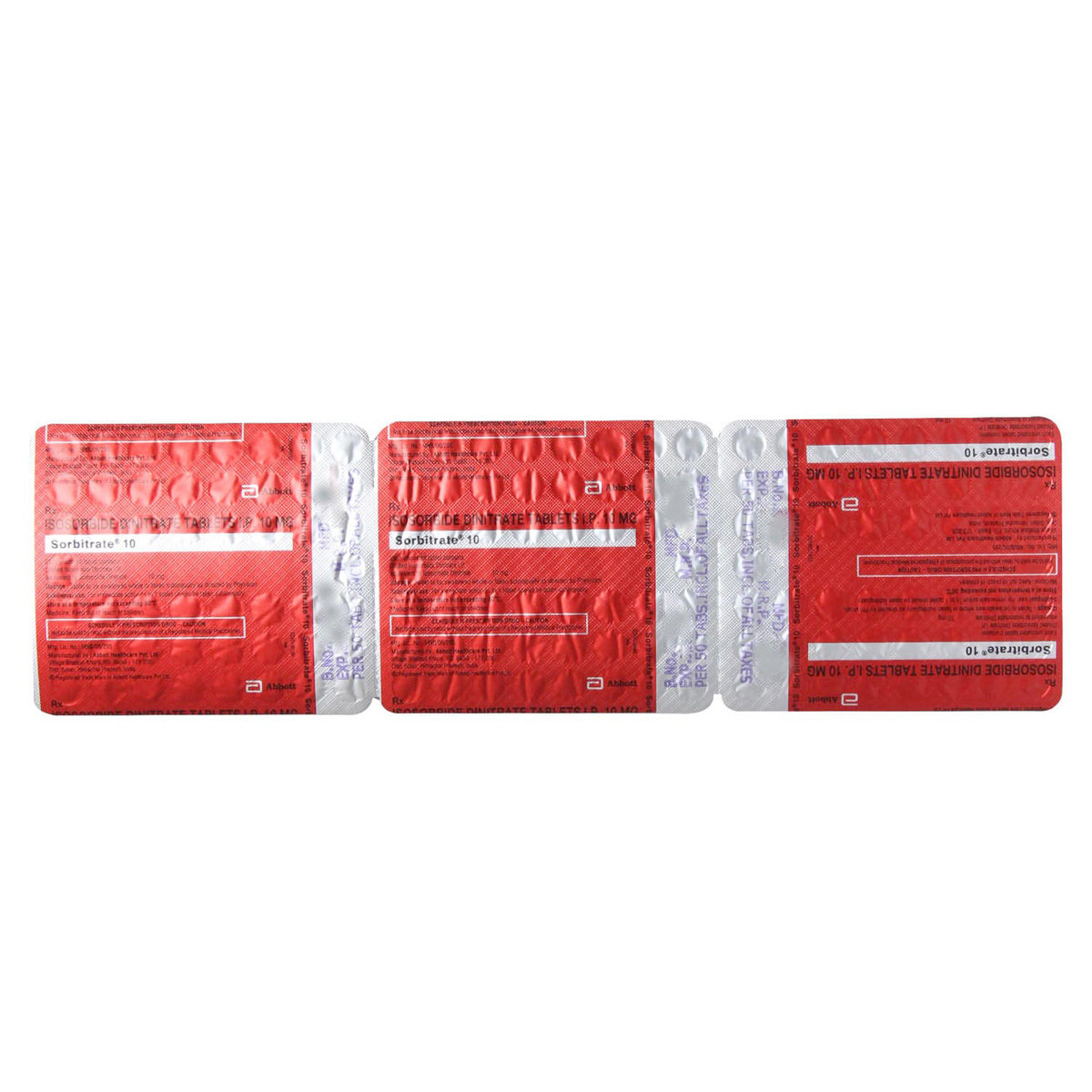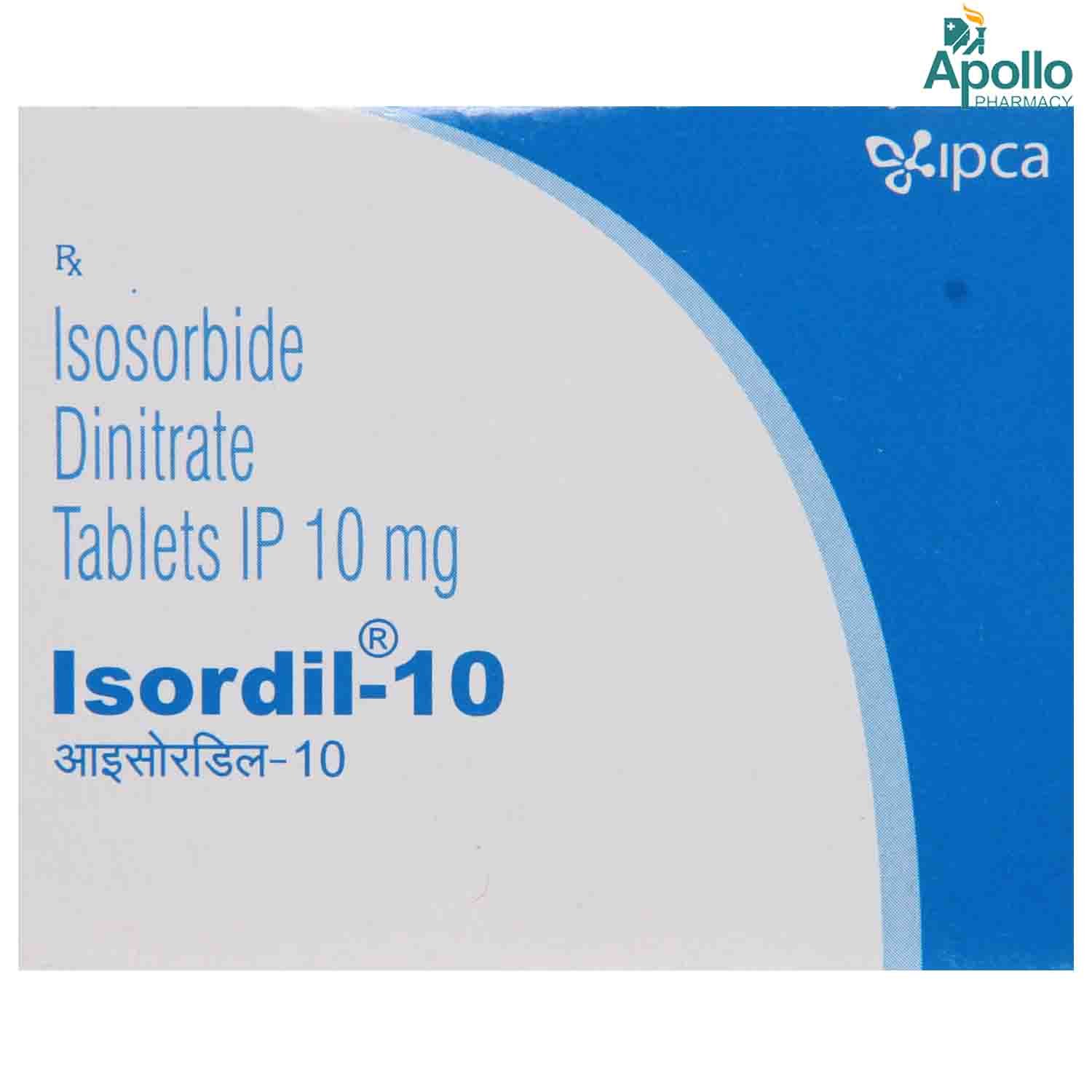Sorbitrate 10 mg Tablet 50's
MRP ₹43
(Inclusive of all Taxes)
₹6.5 Cashback (15%)
Selected Pack Size:50
50 ₹38.7
(₹0.77 per unit)
In Stock
40 ₹40.5
(₹1.01 per unit)
Out of stock
Provide Delivery Location
Online payment accepted
 Prescription drug
Prescription drugWhats That
 12 people bought
12 people bought Composition :
Manufacturer/Marketer :
Consume Type :
Expires on or after :
Return Policy :
About Sorbitrate 10 Tablet
Sorbitrate 10 Tablet belongs to the class of blood pressure-lowering medications called ‘nitrate vasodilators’ used in the prevention of angina (heart-related chest pain) or heart failure. Angina pectoris (angina) is chest pain occurring due to reduced blood flow to the heart (coronary artery disease). It occurs when the blood vessels supplying the heart are blocked or narrowed.
Sorbitrate 10 Tablet contains ‘isosorbide dinitrate’ which works by dilating, relaxing, and widening the constricted blood vessels, thereby increasing the blood and oxygen supply to the heart. Thus, it effectively helps prevent the risk of future heart attack and stroke in the future, especially in high blood pressure patients.
Take Sorbitrate 10 Tablet as prescribed. Your doctor will advise you on how often you take Sorbitrate 10 Tablet based on your medical condition. The common side-effects of Sorbitrate 10 Tablet are headache (during initial days of therapy) and flushing (reddening of the skin, especially the face). These side effects usually disappear without requiring medical attention. However, consult your doctor immediately if these effects persist or worsen.
Do not take it if you are allergic to ‘isosorbide dinitrate’ or any ingredients of it. Do not use in patients with severe heart failure, severe hypotension (low blood pressure), bleeding in the brain, severe dehydration, heart valve problems, progressive heart failure due to chronic lung disease, severe anemia (low levels of iron), and severe hypoxemia (low levels of oxygen in the blood). Inform your doctor if you have an underactive thyroid gland, glaucoma (an eye condition), or head injury. Inform your doctor if you are taking other prescription or non-prescription medicines, especially medicines used to treat erectile dysfunction in men. Sorbitrate 10 Tablet contains lactose, so inform your doctor if you have an intolerance to some sugars. Also, inform your doctor if you are pregnant or breastfeeding.
Uses of Sorbitrate 10 Tablet
Directions for Use
Key Benefits
Sorbitrate 10 Tablet contains ‘isosorbide dinitrate’ which is a ‘nitrate’ and a vasodilator. It acts by dilating and relaxing the constricted blood vessels due to increased blood pressure (hypertension). This effect helps in improving the blood and oxygen supply to the heart, thus decreasing the risk of angina or heart-related chest pain. Thus, Sorbitrate 10 Tablet prevents the risk of chest pain in heart conditions like coronary artery disease.
Storage
- Hydrate your body: Drink enough water to prevent dehydration and headaches.
- Calm Your Mind: Deep breathing and meditation can help you relax and relieve stress.
- Rest and Recharge: Sleep for 7-8 hours to reduce headache triggers.
- Take rest: lie down in a quiet, dark environment.
- Cold or warm compresses can help reduce tension.
- Stay Upright: Maintain good posture to keep symptoms from getting worse.
- To treat headaches naturally, try acupuncture or massage therapy.
- Over-the-counter pain relievers include acetaminophen and ibuprofen.
- Prescription Assistance: Speak with your doctor about more substantial drug alternatives.
- Severe Headaches: Seek emergency medical assistance for sudden, severe headaches.
- Frequent Headaches: If you get reoccurring headaches, consult your doctor.
- Headaches with Symptoms: Seek medical attention if your headaches include fever, disorientation, or weakness.
- If you experience low blood pressure symptoms like dizziness, lightheadedness, or fainting while taking medication, seek immediate medical attention.
- Make lifestyle modifications and adjust your medication regimen under medical guidance to manage low blood pressure.
- As your doctor advises, regularly check your blood pressure at home. Record your readings to detect any changes and share them with your doctor.
- Fluid intake plays a vital role in managing blood pressure by maintaining blood volume, regulating blood pressure, and supporting blood vessel function. Drinking enough fluids helps prevent dehydration, maintain electrolyte balance, and regulate fluid balance.
- Take regular breaks to sit or lie down if you need to stand for long periods.
- When lying down, elevate your head with extra pillows to help improve blood flow.
- Avoid heavy exercise or strenuous activities that can worsen low blood pressure.
- Wear compression socks as your doctor advises to enhance blood flow, reduce oedema, and control blood pressure.
- If symptoms persist or worsen, or if you have concerns about your condition, seek medical attention for personalized guidance and care.
- Wear compression garments like stockings, sleeves, or gloves to apply pressure and help stop fluid from building up, especially after the swelling goes down.
- Move around and do exercises to help the fluid circulate, especially in swollen limbs. Ask your doctor for specific exercises.
- Raise the swollen area above your heart level several times a day, even while sleeping, to help reduce swelling.
- Gently massage the swollen area with firm but not painful pressure.
- Keep the swollen area clean and moisturized to prevent injury and infection.
- Reduce salt intake to help prevent fluid from building up and worsening the swelling, as advised by a doctor.
- If the swelling does not get better after a few days of home treatment or worsens, consult your doctor right away.
- Inform your doctor about dizziness symptoms. They may adjust your medication regimen or prescribe additional medications to manage symptoms.
- Follow your doctor's instructions for taking medication, and take it at the same time every day to minimize dizziness.
- When standing up, do so slowly and carefully to avoid sudden dizziness.
- Avoid making sudden movements, such as turning or bending quickly, which can exacerbate dizziness.
- Drink plenty of water throughout the day to stay hydrated and help alleviate dizziness symptoms.
- If you're feeling dizzy, sit or lie down and rest until the dizziness passes.
- Track when dizziness occurs and any factors that may trigger it, and share this information with your doctor to help manage symptoms.
Drug Warnings
Do not take Sorbitrate 10 Tablet if you are allergic to ‘isosorbide dinitrate’ or its contents. Do not take it if you have severe low blood pressure, bleeding or increased pressure in the brain, severe dehydration, heart valve problems, inflammation of the heart wall, high blood pressure due to long-term lung disease, and severe anemia. Before taking Sorbitrate 10 Tablet , inform your doctor if you have glaucoma (increased pressure in the eye), glucose 6 phosphate dehydrogenase deficiency (a type of anemia), underactive thyroid (hypothyroidism), kidney or liver problems, head injury, hypothermia (low body temperature), or intolerance to some sugars. This medicine should not be used with medicines used for erectile dysfunction like sildenafil or tadalafil. Inform your doctor if you are pregnant or breastfeeding.
Drug-Drug Interactions
Drug-Drug Interactions
Login/Sign Up
Coadministration of Sorbitrate 10 Tablet and Sildenafil can increase the risk of low blood pressure.
How to manage the interaction:
Taking Sorbitrate 10 Tablet and Sildenafil together is generally avoided as it can lead to an interaction, it can be taken only if advised by your doctor. However, if you experience dizziness, lightheadedness, fainting, headache, flushing, heart palpitations, and priapism (prolonged and painful erection unrelated to sexual activity) contact your doctor immediately. Do not discontinue any medications without first consulting your doctor.
Taking Tadalafil with Sorbitrate 10 Tablet can increase the risk or severity of low blood pressure.
How to manage the interaction:
Taking Sorbitrate 10 Tablet with Tadalafil is not recommended, but it can be taken together if prescribed by a doctor. However, consult a doctor if you experience dizziness, or heart palpitations. Do not discontinue any medications without consulting a doctor.
Taking Riociguat with Sorbitrate 10 Tablet may lead to excessively low blood pressure.
How to manage the interaction:
Taking Sorbitrate 10 Tablet with Riociguat is not recommended, but it can be taken together if prescribed by a doctor. However, consult your doctor if you experience dizziness, lightheadedness, fainting, headache, flushing, heart palpitations, priapism in males (persistent and painful erection unrelated to sexual activity). Do not discontinue any medications without consulting a doctor.
Taking Avanafil with Sorbitrate 10 Tablet can cause low blood pressure.
How to manage the interaction:
Taking Sorbitrate 10 Tablet with Avanafil is not recommended, but it can be taken together if prescribed by a doctor. However, consult your doctor if you experience dizziness, lightheadedness, fainting, headache, flushing, heart palpitations, priapism in males (persistent and painful erection unrelated to sexual activity). Do not discontinue any medications without consulting a doctor.
Coadministration of Sorbitrate 10 Tablet and cabergoline may decrease your blood pressure.
How to manage the interaction:
Co-administration of Sorbitrate 10 Tablet with Cabergoline can result in an interaction, but it can be taken if your doctor has advised it. If you notice any of these signs - headache, dizziness, feeling lightheaded, or fainting, contact your doctor immediately. Do not stop using any medications without talking to your doctor.
Taking Sorbitrate 10 Tablet with chloroprocaine may cause methemoglobinemia (blood disorder in which too little oxygen is delivered to your cells).
How to manage the interaction:
Although taking Sorbitrate 10 Tablet and chloroprocaine together can possibly result in an interaction, it can be taken if your doctor has prescribed it. However, consult the doctor immediately if you develop gray discoloration of the skin, abnormal blood coloration, nausea, headache, dizziness, lightheadedness, fatigue, shortness of breath, rapid or shallow breathing, a rapid heartbeat, palpitations, anxiety, or confusion. Do not stop using any medications without consulting doctor.
Taking Sorbitrate 10 Tablet with levobupivacaine may cause methemoglobinemia (blood disorder in which too little oxygen is delivered to your cells).
How to manage the interaction:
Although taking Sorbitrate 10 Tablet and levobupivacaine together can possibly result in an interaction, it can be taken if your doctor has prescribed it. However, consult the doctor immediately if you develop gray discoloration of the skin, abnormal blood coloration, nausea, headache, dizziness, lightheadedness, fatigue, shortness of breath, rapid or shallow breathing, a rapid heartbeat, palpitation, anxiety, or confusion. Do not stop using any medications without consulting doctor.
Taking Sorbitrate 10 Tablet with ropivacaine may cause methemoglobinemia (blood disorder in which too little oxygen is delivered to your cells).
How to manage the interaction:
Although taking Sorbitrate 10 Tablet and ropivacaine together can possibly result in an interaction, it can be taken if your doctor has prescribed it. However, consult the doctor immediately if you develop gray discoloration of the skin, abnormal blood coloration, nausea, headache, dizziness, lightheadedness, fatigue, shortness of breath, rapid or shallow breathing, a rapid heartbeat, palpitation, anxiety, or confusion. Do not stop using any medications without consulting doctor.
Taking Sorbitrate 10 Tablet with lidocaine may cause methemoglobinemia (blood disorder in which too little oxygen is delivered to your cells).
How to manage the interaction:
Although taking Sorbitrate 10 Tablet and lidocaine together can possibly result in an interaction, it can be taken if your doctor has prescribed it. However, consult the doctor immediately if you develop gray discoloration of the skin, abnormal blood coloration, nausea, headache, dizziness, lightheadedness, weakness, shortness of breath, rapid or shallow breathing, a rapid heartbeat, palpitation, anxiety, or confusion. Do not stop using any medications without consulting doctor.
Taking Sorbitrate 10 Tablet with sodium nitrite may cause methemoglobinemia (blood disorder in which too little oxygen is delivered to your cells).
How to manage the interaction:
Although taking Sorbitrate 10 Tablet and sodium nitrite together can possibly result in an interaction, it can be taken if your doctor has prescribed it. However, consult the doctor immediately if you develop gray discoloration of the skin, abnormal blood coloration, nausea, headache, dizziness, lightheadedness, fatigue, shortness of breath, rapid or shallow breathing, a rapid heartbeat, palpitation, anxiety, or confusion. Do not stop using any medications without consulting doctor.
Drug-Food Interactions
Drug-Food Interactions
Login/Sign Up
Diet & Lifestyle Advise
- Eat plenty of fresh fruits and vegetables. Opt for whole grains rather than refined or polished grains. Choose lean proteins, such as skinless chicken and fish. Opt for non-fat or low-fat dairy products.
- Do not take food containing high levels of sodium (salt).
- Drink plenty of fluids to prevent dehydration.
- Maintain a normal weight. Shed excess weight by exercising regularly for at least 30 min a day.
- Manage stress.
- Limit alcohol intake and quit smoking.
Side Effects of Sorbitrate 10 Tablet
- Headache
- Flushing (redness of the skin, especially the face)
- Low blood pressure
- Dizziness
Habit Forming
Therapeutic Class
All Substitutes & Brand Comparisons
RX
Isordil-10 Tablet 10's
Ipca Laboratories Ltd
₹8
(₹0.72 per unit)
6% CHEAPERRX
Out of StockIsmotag 10mg Tablet
Innovative Pharmaceuticals Pvt Ltd
₹8.1
(₹0.73 per unit)
5% CHEAPERRX
Out of StockSorbitrate 10 mg Tablet 40's
Abbott India Ltd
₹45
(₹1.01 per unit)
31% COSTLIER
Drug-Diseases Interactions
Drug-Diseases Interactions
Login/Sign Up
FAQs
Sorbitrate 10 Tablet is a 'vasodilator' and can prevent angina effectively. It works by relaxing the muscles of blood vessels. It helps to dilate the narrowed blood vessels resulting in increased blood and oxygen supply to the heart. This prevents heart-related chest pain known as angina.
Sorbitrate 10 Tablet is used to prevent angina attacks. However, it cannot stop the angina attack that has already started as it works very slowly (delayed onset of action).
Sorbitrate 10 Tablet may decrease blood pressure (hypotension). So it should not be used in patients with severe hypotension.
Lisinopril is a medication used to treat high blood pressure. Using Sorbitrate 10 Tablet with lisinopril may cause a decrease in blood pressure (hypotension). So, consult your doctor before taking other medications while using Sorbitrate 10 Tablet .
Use of Sorbitrate 10 Tablet together with sildenafil is not recommended as it may cause a sudden decrease in blood pressure leading to loss of consciousness, even leading to coma stage.
Sorbitrate 10 Tablet is given for heart-related chest pain (angina), a life-long or chronic disease, especially in high blood pressure patients and coronary heart disease (CAD). So, do not stop taking Sorbitrate 10 Tablet even if you feel better. It would be best if you took Sorbitrate 10 Tablet until your doctor tells you to stop.
Sorbitrate 10 Tablet is sometimes used only when needed, you may not be on a dosing schedule. If you are on a schedule, take the missed dose as soon as you remember or if it's nearly time for your next dose, skip your missed dose. Do not use extra medicine to make up a missed dose.
Drug-Drug Interactions Checker List
- TADALAFIL
- SILDENAFIL
- VARDENAFIL
- AVANAFIL
- RIOCIGAUT
- NOREPINEPHRINE
Special Advise
- Sorbitrate 10 Tablet may cause orthostatic hypotension (low blood pressure on standing). So, do no rise up quickly from a sitting or lying position suddenly.
- You may develop tolerance to Sorbitrate 10 Tablet with time, meaning that the same dose may be less effective next time. Follow the prescribed dosing schedule to avoid this.
- Keep all appointments. Your doctor will monitor your condition during the follow-up visits while taking this medication.
Disease/Condition Glossary
Angina pectoris: It is the medical term for heart-related chest pain. It occurs when there is a reduction in blood supply to the heart due to the blockage of one or more arteries (coronary heart disease). Patients with angina often explain chest pain as squeezing, tightening, or pressure in the chest. Other symptoms can be dizziness, sweating, heartburn, and difficulty breathing.

Have a query?
Alcohol
Safe if prescribed
Alcohol may worsen the condition by increasing the risk of side-effects. So, do not take alcohol
Pregnancy
Consult your doctor
Sorbitrate 10 Tablet is a category C medicine and may cause harm to the fetus. It should be used in pregnant women if clinically needed and when benefits outweigh the risks.
Breast Feeding
Consult your doctor
Sorbitrate 10 Tablet should be used with caution in breastfeeding mothers.
Driving
Safe if prescribed
Sorbitrate 10 Tablet may cause dizziness and affect your ability to drive. So, avoid driving or operating heavy machinery while using Sorbitrate 10 Tablet .
Liver
Consult your doctor
Sorbitrate 10 Tablet should be used with caution in patients with liver diseases. Dose adjustments may be required in severe liver disease patient.
Kidney
Consult your doctor
Sorbitrate 10 Tablet should be used with caution in patients with kidney diseases. Dose adjustments may be required.
Children
Safe if prescribed
$should not be used in children unless clinically needed. Dose adjustments may be necessary.

